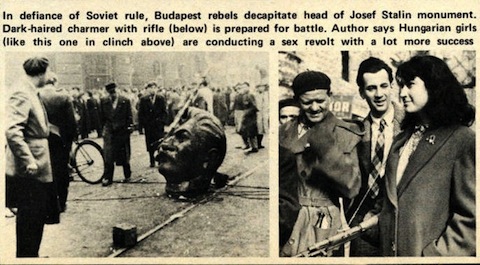
I recently spent the better part of a day trying to verify a single, rather insignificant fact for my next book—namely, whether an interviewee’s claim to have received a certain model of Omega watch in early 1978 jibed with Omega’s production schedule. (It did.) Having expended way too much mental bandwidth to accomplish that one reportorial task, I can’t help but wonder how much better life would be if contemporary non-fiction operated according to the rules of Cold War-era pulp magazines. Because as this interview with the writer behind an article entitled “Budapest’s Sex Revolt” makes clear, accuracy was the least of that industry’s concerns:
You wrote hundreds of action, adventure and war stories for men’s adventure magazines. Did you also write a lot of “sex exposé” stories and were they your ideas or suggested by editors?
DORR: I wrote dozens of sex exposé stories and I did it all without having sex with anybody. With one exception involving one article, no editor ever suggested a topic to me. I simply looked at what the magazines were publishing and tried to copy it.
The Budapest story has references to true history and a lot of details about the city. How much was based on personal knowledge versus imagination?
DORR: I’ve never been to Budapest. I don’t remember how I wrote the story. I believe “pure imagination” was a big factor. Remember that any place with a faraway name was deemed exotic back in 1970 and not very many other Americans had ever been to Budapest, either.
Keep that in mind the next time some media pundit tries to convince you that the seventies were some sort of Golden Age of reportorial truth. Woodward and Bernstein were the exception, not the rule.


Like gas stations in rural Texas after 10 pm, comments are closed.